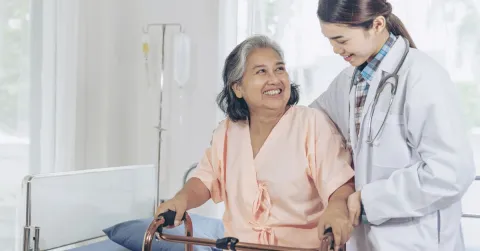The Aging Process and Working with the Elderly
Overview
RPM 202 - Working with the elderly requires showing empathy, meeting the patients’ needs, and developing a rapport with them. Understanding the aging process and the systems of care available to the elderly will enable effective care coordination. This course will enable trainees to learn about the cultural differences and the healthy aging process.
Trainees will be able to work with elderly patients. At the end of the badge, trainees will be able to do the following:
- Explain the aging process and stages of life
- Analyze the basic needs of the elderly
- Explain how chronic illness is common in the elderly
- Define the systems of care available to the elderly
- Compare and contrast elderly care in various cultures
- Synthesize the basic ideas in the United Nations’ goal for healthy aging
Time Estimate:
3 hours
Course Content
LESSONS
1. The Aging Process
Lesson Content
Introduction
default
The 5 Stages of Aging
default
Pop Quiz: The 5 Stages of Aging
pop_quiz
Pillars of Aging
default
Pop Quiz: Pillars of Aging
pop_quiz
Types and Factors of Aging
default
Pop Quiz: Types and Factors of Aging
pop_quiz
Factors That Slow or Speed Up Aging Process
default
Pop Quiz: Factors That Slow or Speed Up Aging Process
pop_quiz
2. Needs of the Elderly
Lesson Content
Biological and Environmental Factors
default
Pop Quiz: Biological and Environmental Factors
pop_quiz
Psychological Needs
default
Pop Quiz: Psychological Needs
pop_quiz
Behavioral and Social Processes
default
Pop Quiz: Behavioral and Social Processes
pop_quiz
Declines in Function of Senses
default
Pop Quiz: Declines in Function of Senses
pop_quiz
Decline in Activities of Daily Living
default
Pop Quiz: Decline in Activities of Daily Living
pop_quiz
3. Chronic Illness and Elderly
Lesson Content
Biology of Aging (National Institute on Aging)
default
Pop Quiz: Biology of Aging
pop_quiz
Common Illnesses
default
Pop Quiz: Common Illnesses
pop_quiz
Genetic, Environmental, Lifestyle, Behavioral, and Social Factors
default
Pop Quiz: Genetic, Environmental, Lifestyle, Behavioral, and Social Factors
pop_quiz
Interventions to Slow Aging Process
default
Pop Quiz: Interventions to Slow Aging Process
pop_quiz
4. Systems of Care for the Elderly
Lesson Content
The 4 M Framework
default
Pop Quiz: The 4 M Framework
pop_quiz
In-Home Care
default
Pop Quiz: In-Home Care
pop_quiz
Hourly Respite Stay
default
Pop Quiz: Hourly Respite Stay
pop_quiz
Community Based Care
default
Pop Quiz: Community Based Care
pop_quiz
Independent Living Progression to Assisted Living
default
Pop Quiz: Independent Living Progression to Assisted Living
pop_quiz
Hospice Care
default
Pop Quiz: Hospice Care
pop_quiz
Palliative Care
default
Pop Quiz: Palliative Care
pop_quiz
Nursing Homes
default
Pop Quiz: Nursing Homes
pop_quiz
Medicare and Medicaid or Medical
default
Pop Quiz: Medicare and Medicaid or Medical
pop_quiz
5. Cultural Aspects of Aging and Elderly Care
Lesson Content
Eastern Cultures/Attitudes Toward Aging
default
Pop Quiz: Eastern Cultures/Attitudes Toward Aging
pop_quiz
Western Cultures/Attitudes Toward Aging
default
Pop Quiz: Western Cultures/Attitudes Toward Aging
pop_quiz
Native American Cultures/Attitudes Toward Aging
default
Pop Quiz: Native American Cultures/Attitudes Toward Aging
pop_quiz
Hispanic Cultures/Attitudes Toward Aging
default
Pop Quiz: Hispanic Cultures/Attitudes Toward Aging
pop_quiz
Assumptions from Differences
default
Pop Quiz: Assumptions from Differences
pop_quiz
Communication Styles of Various Cultures
default
Pop Quiz: Communication Styles of Various Cultures
pop_quiz
SUMMARY
Key Concepts
Assessment: The Aging Process and Working with the Elderly
Image
